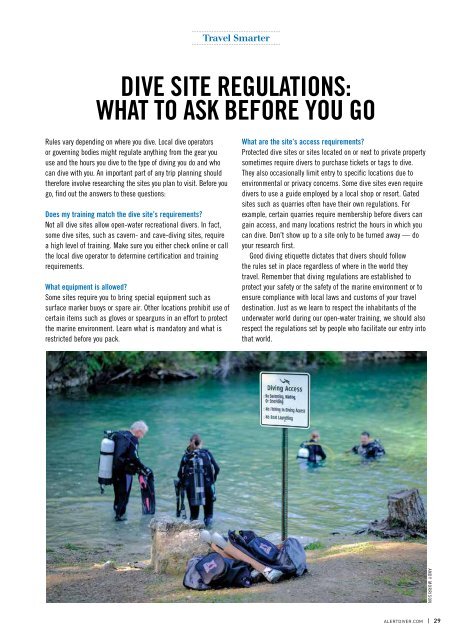AD 2016 Q1
You also want an ePaper? Increase the reach of your titles
YUMPU automatically turns print PDFs into web optimized ePapers that Google loves.
Travel Smarter<br />
DIVE SITE REGULATIONS:<br />
WHAT TO ASK BEFORE YOU GO<br />
Rules vary depending on where you dive. Local dive operators<br />
or governing bodies might regulate anything from the gear you<br />
use and the hours you dive to the type of diving you do and who<br />
can dive with you. An important part of any trip planning should<br />
therefore involve researching the sites you plan to visit. Before you<br />
go, find out the answers to these questions:<br />
Does my training match the dive site’s requirements?<br />
Not all dive sites allow open-water recreational divers. In fact,<br />
some dive sites, such as cavern- and cave-diving sites, require<br />
a high level of training. Make sure you either check online or call<br />
the local dive operator to determine certification and training<br />
requirements.<br />
What equipment is allowed?<br />
Some sites require you to bring special equipment such as<br />
surface marker buoys or spare air. Other locations prohibit use of<br />
certain items such as gloves or spearguns in an effort to protect<br />
the marine environment. Learn what is mandatory and what is<br />
restricted before you pack.<br />
What are the site’s access requirements?<br />
Protected dive sites or sites located on or next to private property<br />
sometimes require divers to purchase tickets or tags to dive.<br />
They also occasionally limit entry to specific locations due to<br />
environmental or privacy concerns. Some dive sites even require<br />
divers to use a guide employed by a local shop or resort. Gated<br />
sites such as quarries often have their own regulations. For<br />
example, certain quarries require membership before divers can<br />
gain access, and many locations restrict the hours in which you<br />
can dive. Don’t show up to a site only to be turned away — do<br />
your research first.<br />
Good diving etiquette dictates that divers should follow<br />
the rules set in place regardless of where in the world they<br />
travel. Remember that diving regulations are established to<br />
protect your safety or the safety of the marine environment or to<br />
ensure compliance with local laws and customs of your travel<br />
destination. Just as we learn to respect the inhabitants of the<br />
underwater world during our open-water training, we should also<br />
respect the regulations set by people who facilitate our entry into<br />
that world.<br />
ANDY MORRISON<br />
ALERTDIVER.COM | 29









